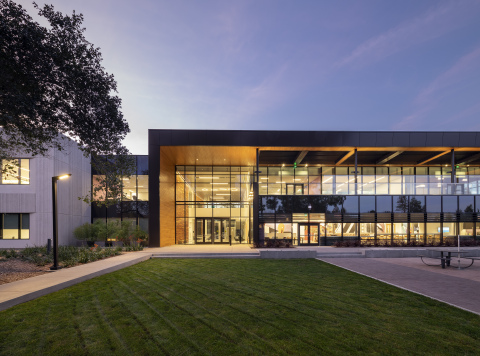The Arc Institute Launches to Accelerate Scientific Breakthroughs in Complex Diseases in Collaboration with Stanford University, UCSF, and UC Berkeley
The Arc Institute Launches to Accelerate Scientific Breakthroughs in Complex Diseases in Collaboration with Stanford University, UCSF, and UC Berkeley
PALO ALTO, Calif.--(BUSINESS WIRE)--Today, the Arc Institute officially launched as an independent, non-profit research institution and announced new collaborations with Stanford University, the University of California, Berkeley (UC Berkeley), and the University of California, San Francisco (UCSF).
Dedicated to understanding complex human diseases, the Arc Institute is pioneering a new model for collaborative research that integrates long-term and unconstrained funding for ambitious science, centers for the rapid development of biotechnologies, and the scientific excellence of world-class research universities. By bringing together scientists across many disciplines, Arc aims to enable new discoveries that ultimately improve human health.
Headquartered in the Stanford Research Park in Palo Alto, California, Arc's donors will contribute more than $650M to the Institute to allow it to fully sustain scientists and their research for renewable eight-year terms. The Institute is founded by Silvana Konermann, Patrick Hsu, and Patrick Collison, part of the team behind Fast Grants, which launched in the early days of the COVID-19 pandemic to provide immediate funding to researchers with promising ideas.
“I am tremendously excited about this visionary organization that is creating an environment for close collaboration among some of our best scientists across the Bay Area to accelerate discovery and tackle the most challenging diseases,” said Marc Tessier-Lavigne, President of Stanford University. “We’re delighted to be part of the Arc Institute collaboration.”
“Our goal at Arc is to enable scientists to freely pursue the ideas they’re the most passionate about," said Silvana Konermann, assistant professor of biochemistry at Stanford University School of Medicine. “To unlock their full potential, we are structuring the Institute around four core concepts built to enable high-risk, high-reward science.”
The Arc Institute Model
Curiosity-driven science
Arc believes that scientists can benefit tremendously from funding, infrastructure, and operations support that enables them to work on their most important ideas. Arc Core Investigators will be hired for renewable, eight-year appointments to support both exploratory and long-term research directions. Arc funding provides full salary and research support for their laboratories, freeing Core Investigators from the challenges of incessant grant applications and fundraising. Arc investigators may hold faculty positions at Stanford, UC Berkeley, and UCSF, and graduate students enrolled at these universities will be able to pursue their PhD studies at Arc labs.
New career paths
As biomedical research has become more advanced, it has also become more dependent on complex and specialized tooling. Arc Technology Centers will focus on advancing and distributing key biomedical technologies within the Institute and the broader scientific community that require high-capital scale, targeted expertise, and systematic innovation.
“At Arc, we want to take full advantage of the ongoing Cambrian explosion in experimental and computational technologies,” said Patrick Hsu, assistant professor of bioengineering at the University of California, Berkeley. “In addition to creating new collaborative training models, we are also committed to creating attractive career paths for scientists and engineers beyond their training period to focus on technology development.”
Collaborations
By physically uniting the Core Investigator and Technology Center laboratories within Arc headquarters, the Institute strives to increase the collision frequency of new ideas and joint projects. Arc will make it easy for biologists to work with technology developers to apply advanced tools. Additionally, Arc is starting an Affiliate Investigator program to support faculty who are primarily located at Stanford, UC Berkeley, and UCSF, expanding the intellectual connection among the four institutions.
“The last two years of the pandemic have highlighted the importance of open collaboration, basic science, and medical technology in advancing human knowledge and society,” said Carol Christ, Chancellor of the University of California, Berkeley. “These are the innovative public-private partnerships that are needed to accelerate breakthroughs in the life sciences.”
Impact on patients
In addition to curiosity-driven knowledge building, producing medically useful discoveries is a core mission of Arc. Arc will build translational infrastructure to support the distribution of new biological insights and biotechnologies into the clinical environment.
“The translational focus of the Institute and these new partnerships will move great ideas and insights out of the laboratory and into new companies and the clinic,” said Sam Hawgood, Chancellor of UCSF. “It is a tremendous opportunity to bring together scientists from three premier research institutions with the resources they need to develop innovative new treatments for devastating diseases.”
To learn more or to view open roles, please visit arcinstitute.org.
Contacts
Media Contact:
Vicki Lin
media@arcinstitute.org
